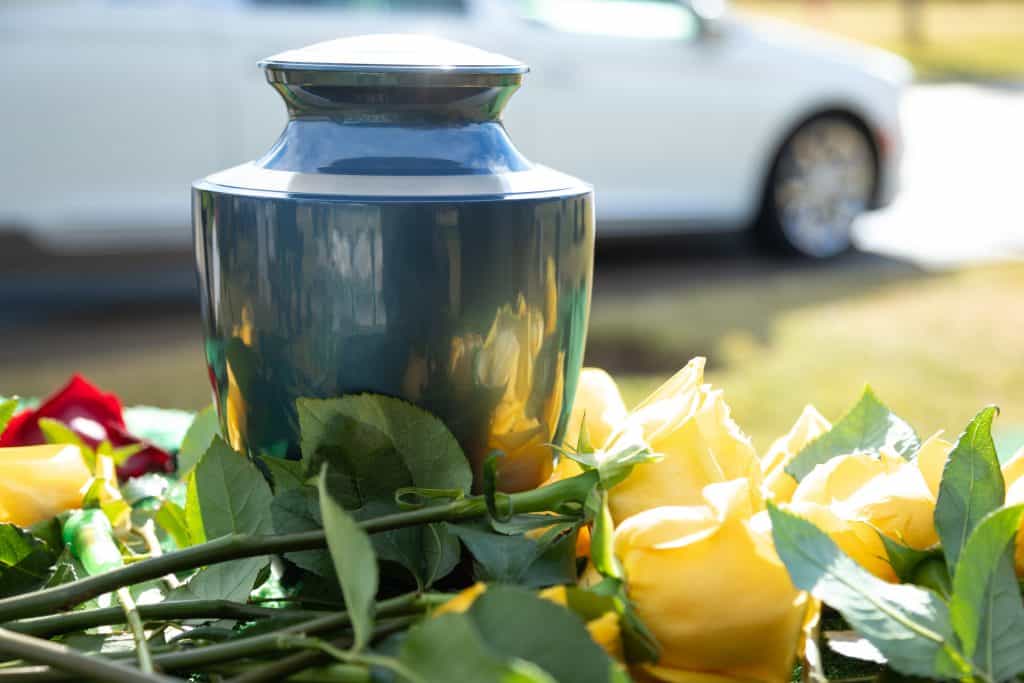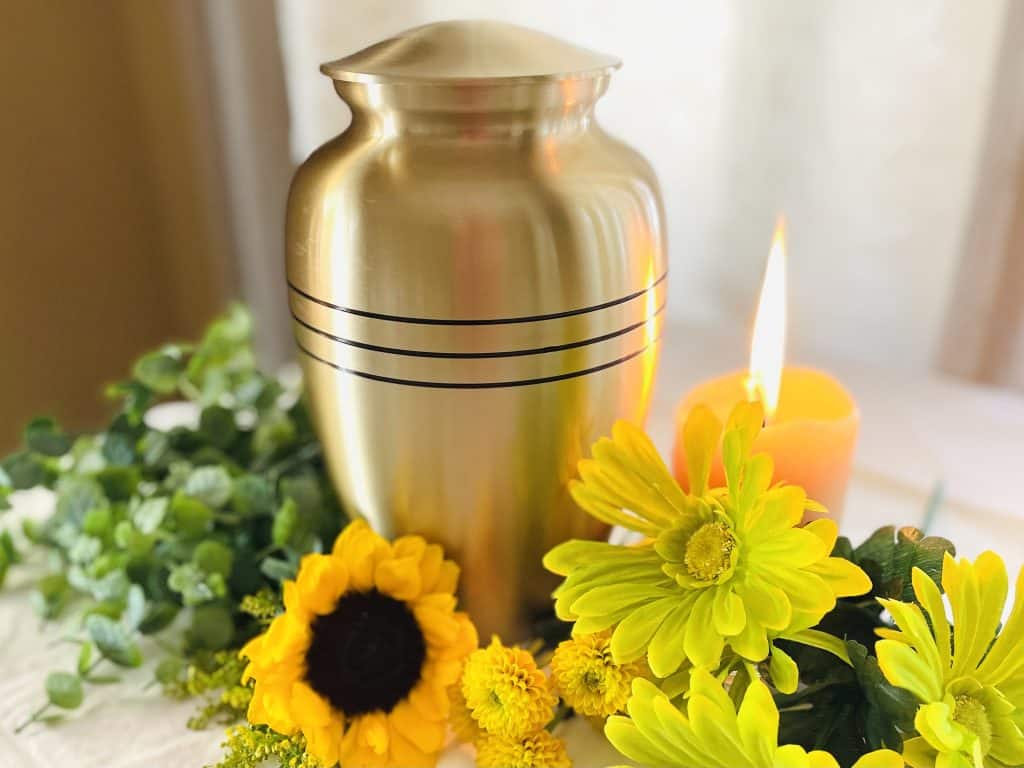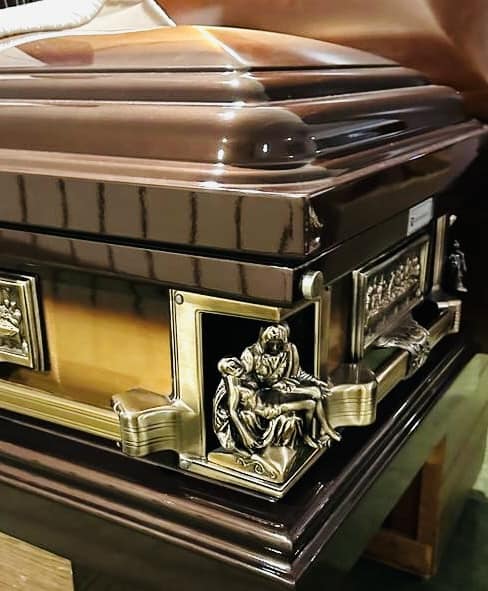California Funeral & Cremation Services Guide
This guide aims to answer some key questions about making funeral or cremation arrangements in California. We provide an overview of some legal aspects of making funeral plans specific to California funeral laws and what funeral or cremation costs to expect.
With the average traditional funeral in California costing between $7,000 and $10,000, and that’s before a cemetery plot and grave marker are added to the total bill, it’s not hard to see why more families in California are considering cremation as an alternative.

Cremation is not only significantly less expensive, but it also allows families much more flexibility in planning a memorial service. Unlike the traditional funeral burial, where everything must be planned and arranged quickly, a cremation can happen immediately after the death.
Direct Cremation is the least expensive type of cremation. However, you may find some funeral homes reluctant to want to talk about this as an option, and often the funeral directors will want to discuss other products and services available, as extras. With a direct cremation, the funeral director chosen is responsible for:
- collecting the body from the place of death
- storage of the deceased prior to the cremation
- filing the legal paperwork
- taking the body to the crematory for cremation
- returning the ashes to family or next of kin
Comparison of Cremation Costs in Cities in California
Below is a table of average direct cremation costs versus inexpensive direct cremation.
| CITY | Average direct cremation cost* | Affordable Cremation | Phone |
|---|---|---|---|
| Los Angeles | $1,655 | $1,045 | (323) 798-9055 |
| San Diego | $1,374 | $1,195 | (619) 268-1962 |
| San Jose | $1,907 | $1,195 | (408) 214-9896 |
| San Francisco | $1,998 | $1,195 | (415) 286-9121 |
| Fresno | $1,506 | $1,195 | (559) 241-8161 |
| Sacramento | $1,613 | $1,195 | (916) 229-6141 |
| Long Beach | $1,655 | $1,045 | (323) 798-9055 |
| Oakland | $1,900 | $1,195 | (510) 210-0755 |
| Bakersfield | $1,558 | $1,195 | (661) 206-2123 |
| Anaheim | $1,581 | $1,045 | (949) 220-2557 |
One of the first things many families turn to do when a death occurs is to choose a funeral or cremation service provider to handle the services. With around 1,200 funeral homes throughout California, selecting the best provider can be pretty daunting. It can help you formulate some clear criteria for what you want from a funeral director before contacting any mortuaries.
Do you require burial or cremation? Do you want traditional or contemporary services? Are you planning ceremony services at the funeral home and, therefore, require a suitable venue/location? What budget do you have for funeral expenses? Just these few questions can help present a clearer idea of what kind of funeral services provider you need.
If you need to find a funeral home or cremation provider in California, you can use our funeral home directory, which lists funeral homes by city.
What is the average cost of a cremation in California?
California is one of the states where cremation rates are higher [7 out of 10 Californians choose cremation]. This generally means that you can arrange a cremation at a lesser cost than in many other states. California is one of only 2 states where ‘direct disposers’ are licensed.
If the cost of a cremation is important to you, you may wish to check with DFS Memorials. This low-cost funeral and cremation provider network has several locations throughout California. They all offer affordable prices for direct cremation and/or a traditional funeral.
By law, all funeral establishments MUST quote prices over the telephone and provide you with a General Price List (GPL) when you make an inquiry.

Cremation Services in California – laws that govern cremation & what you need to know
Cremation services are available from most funeral homes in California. The average cost of a cremation can vary quite significantly, so it is important to compare cremation prices and ensure you are comparing like for like. For example, the cost of a basic cremation in Los Angeles can range between $995 and $3,000.
No casket is required by law for cremation, but a suitable rigid cremation container is required. This can be a simple cardboard container. Some funeral homes offer rental caskets if a service is to be held before the cremation.
The next of kin must sign the Declaration for Disposition of Cremated Remains, which a funeral home will usually arrange as part of its services. Most states have a mandatory wait time (24-48 hours) after death before a cremation can proceed. However, the County Medical Examiner or a Justice of the Peace can waive this requirement.
Check out our Guide to Cremation Costs in California for more information.
Who has the legal responsibility for making funeral arrangements?

California statute states that an agent under a power of attorney, a spouse or registered domestic partner, any adult children, parents, adult siblings, or other surviving competent adult kin have the right to make decisions about disposition arrangements after an individual’s death unless other written instructions are left.
Arranging a direct cremation in California
As California direct cremation services are popular, and the state licenses direct disposition, a complete direct cremation can be obtained at a very competitive price.
Be sure to check around and make sure any direct cremation prices quoted include the same service/products. There is something of a ‘price war’ on direct cremation in California, but some cremation providers may not include all costs in an advertised direct cremation package. Be sure to check that the price includes the cremation container and crematory fee.
The cremation permit and death certificate fees are often additional ‘cash advances’ or cash disbursements.
If you are concerned about funeral costs, California’s DFS Memorials providers offer low-cost cremation and burial services. All DFS Memorials providers guarantee to offer a ‘best value’ direct cremation package.
What is the average cost of a traditional funeral?

Funeral costs do vary considerably. The cost of a funeral can differ between providers for the same service, and many funeral homes refrain from disclosing prices because they claim that funerals are not “cookie-cutter.”
The National Funeral Directors Association (NFDA) surveyed the average cost of a funeral at $7,848, and this was without cemetery costs. Therefore, it is fair to say that the average traditional burial cost in the region of $10,000.
Of course, there are much more inexpensive burial options, and it is important to shop around and inquire from at least three funeral homes.
Arranging a traditional burial in California
Californian law does not require vaults or grave liners. Many cemeteries may have their own policies requiring them as they keep the ground from settling after burial and make mowing and maintenance easier. A vault completely surrounds the funeral casket in concrete or other material, whereas grave liners cover only the top and sides.
Neither is designed to prevent the eventual decomposition of human remains. Many cemeteries also have their own regulations governing the erection of grave markers, so it is wise to fully check cemetery regulations before committing to any vault, grave liner, or grave marker purchases.

Can I conduct a home funeral in California?
Yes. The law does permit you to prepare the body of your loved one for disposition. If you choose to do this, you must file a completed certificate of death signed by the attending physician or coroner with the local registrar of births and deaths.
In addition, you must obtain a permit for disposition from the local registrar of births and deaths and ensure you provide a casket or suitable container. You would then need to make arrangements directly with the cemetery or crematory for interment or cremation.
Human remains may be kept at home until disposition without embalming or refrigeration. However, decomposition will proceed more rapidly without refrigeration or embalming.
How do I arrange a green funeral or natural burial in California?
There is a growing interest in more natural and eco-friendly dispositions. Some consider cremation a ‘greener’ alternative to a traditional funeral service. But, flame cremation uses considerable energy and produces some harmful emissions.
There are several natural burial sites in California, and funeral service providers can offer a natural ‘final journey’ for those who would choose to return to the earth with the least ecological impact.
Visit our Guide to Arranging a Green Burial in California to read more about your natural burial options.
Is embalming required by law in California?
Californian law states that embalming is not required. However, a funeral establishment must refrigerate an unembalmed body within 24 hours if disposition by burial or cremation does not otherwise occur.
You may wish to authorize embalming if there is a delay before a public viewing period. However, you need to realize that embalming does not prevent decomposition.
Purchasing a casket in California

California law permits casket sellers to sell caskets directly to the public. You do not have to purchase your casket directly from a funeral home, but you can purchase one from a casket seller and have it delivered to your funeral home.
They MUST accept it and cannot add a service charge for this. The law does require that casket sellers MUST disclose prices at the onset of any discussion about purchasing a casket.
Casket retailers are not bound by the same laws that govern funeral homes. It is advisable to ensure that you are dealing with a reputable casket supplier. You can often save a significant amount of money by buying a casket directly from a casket retailer, and most can arrange a next-day delivery to your chosen funeral home if required.
Purchasing a grave marker in California
Similarly, a grave marker does not have to be purchased at the time of interment. Generally, cemeteries will not permit erecting a memorial marker until a few months after the burial. This gives the ground a chance to settle and prevent potential subsidence of the monument.
Therefore, this gives you time to shop around without feeling you must commit to a marker while making funeral arrangements.
Check out our ‘Caskets’ and ‘Grave Markers’ sections for a much more detailed overview of purchasing these items.
What can I do with the cremated remains? Laws for Scattering Ashes in California
In California, you may choose any of the following methods of disposition of cremated remains:
- Placement in a columbarium
- Burial in a plot in a cemetery
- Retention at a residence – The funeral establishment or crematory will have you sign the Permit for Disposition showing that the remains were released to you and will file it with the local registrar of births and deaths. You may not remove the cremated remains from the container, and you must arrange for their disposition upon your death.
- Storing in a house of worship or religious shrine depends on local zoning laws.
- Ash Scattering in areas of the state where no local prohibition exists and with the written permission of the property owner or governing agency. The cremated remains must be removed from the container and scattered in a manner so they are not distinguishable to the public.
- Ash Scattering in a cemetery scattering garden
- Ash Scattering at sea, at least 500 yards from shore
In California, cremated remains cannot be transported without a permit from the county health department and may not be disposed of in refuse.
How do I obtain a death certificate in California?
The State Registrar of California Office of Vital Records (OVR) registers all deaths. The fee for a death certificate in California is currently $14.00. You may require more than one death certificate, as you will need to send them off to more than one institution, organization, or government office at the same time.
Most authority bodies that need evidence of the death, i.e., a life insurance company, will require an original copy of a death certificate. Certified copies of a death certificate are usually available within 10 days after the death.
Transporting mortal remains from California to another state or country
Suppose a death has occurred, and you need to arrange to transport your loved one’s body back to a country of origin for burial. In that case, you will need the services of a funeral home in California familiar with funeral shipping. Transporting a body within the U.S. is relatively straightforward, but international mortuary shipping is quite specialized.
Some funeral homes are especially versant with the processes for shipping a Mexican National back to their state in Mexico.
Read our funeral shipping page for more information.
If you do travel regularly for work, pleasure, sport, visiting family, or snow-birding, you may wish to consider our great value Travel Protection Plan. This plan costs just $450 for an individual for lifetime protection against the costly expense of returning a body home if a death occurs 75 miles (or further) from your residence in California. It also provides global coverage. Domestic funeral shipping can cost from $3,000, and International repatriation can start at around $6,900.
Can I donate my body to science in California?
Yes, you can. You can donate through a local medical school or a national body donation program. Visit our Body Donation page to learn more about this option.
Hispanic Funerals in California
California has the highest concentration of Hispanics, mainly immigrants from Mexico. Although many Hispanics and Latinos choose to repatriate remains, the rapidly growing Hispanic-American population in California places a significant emphasis on “memorialization.” This means that Hispanics are more likely to spend money on a funeral as part of the tradition ingrained within their culture. This has meant that a number of Hispanic mortuaries operate in California.
The deceased had no life insurance, and I can’t afford a funeral. What help is there with cremation costs in California?
Sadly, more families are finding themselves in such a situation. The reality is that there is very limited public or state assistance for funeral costs. The state takes care of indigent deaths (as is their responsibility), but this is done by a pauper burial or cremation.
Social Security offers a $255 death benefit payment (if qualifying), and the funeral director will assist you with claiming this.
For some further guidance, read our article What do I do if I Can’t Afford a Funeral?
What steps do I need to take when a death has occurred?
If you choose to use a funeral director’s services, you must select a provider to work with. Once the deceased is in their care, the provider will be able to help walk you through the next steps. Visit our article on ‘How to Save Money Arranging a Funeral or Cremation’ for detailed tips on saving money and checklists to help you make preparations.
What should I do if I have a complaint against a funeral home?
Suppose you should have reason to be dissatisfied with the services of a licensed funeral home. In that case, you can make a formal complaint to the California Department of Consumer Affairs Cemetery and Funeral Bureau. 1625 North Market Blvd, Suite S208, Sacramento, CA 95834 Phone: (916) 574-7870
Hopefully, this basic guide to arranging a funeral or cremation in California has answered some of your questions. Please use our Funeral Resouces section to access further funeral resources. If you have a question or need assistance, don’t hesitate to get in touch with us.
Resources:
Guide to Cremation Costs in California by City
DFS Memorials – Save on Cremation Costs in California
Funeral & Cremation Planning Guide – Los Angeles


